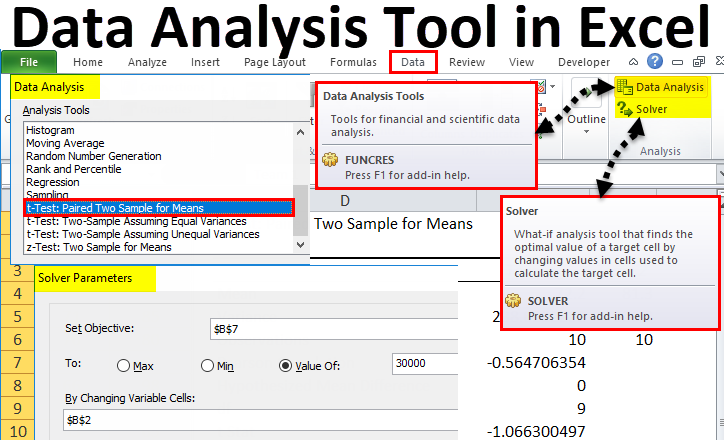
Compare the number of subjects with each outcome by treatment group, using a chi-squared test.Īll of these tasks are routine for a data set of this nature, and all of them could be easily done using any of the aobve listed statistical packages.Do a paired t-test to test whether X and Y are statistically different from each other.Do a two sample t-test to test whether the two treatment groups differ on X and Y.Get means and standard deviations of X and Y for the entire group, and for each treatment group.In order to check a variety of statistical tests, we chose the following tasks: Unless otherwise stated, all statistical tests using Excel were done with the Data Analysis ToolPak. Even so, you may not be able to generate all the parts you need for a complete analysis. Functions generate a single number, so using functions you will likely have to combine bits and pieces to get what you want. Also, you could use functions to generate some statistical measures, such as a correlation coefficient.


Pivot Table in the Data menu can be used to generate summary tables of means, standard deviations, counts, etc. Two other Excel features are useful for certain analyses, but the Data Analysis tool pack is the only one that provides reasonably complete tests of statistical significance. Search in Help for "Data Analysis Tools" for instructions on loading the ToolPak.
#BASIC STATISTICAL ANALYSIS IN EXCEL INSTALL#
If you do not have a Data Analysis item on the Tools menu, you need to install the Data Analysis ToolPak. It includes a variety of choices including simple descriptive statistics, t-tests, correlations, 1 or 2-way analysis of variance, regression, etc. Most of Excel’s statistical procedures are part of the Data Analysis tool pack, which is in the Tools menu. In this article when we say "a statistical package," we mean SPSS, SAS, STATA, SYSTAT, or Minitab. We used SPSS as the standard, though any of the statistical packages OIT supports would do equally well for this purpose. The comparison considered the accuracy of the results as well as the ease with which the interface could be used for bigger data sets - i.e. We used this data to do some simple analyses and compared the results with a standard statistical package. The subjects are entered in the order that the data became available, so the data is not ordered in any particular way. We were unable to get a measurement for Y on the second subject, or on X for the last subject, so these cells are blank. X and Y are the values of two measurements on each subject. The first subject received Treatment 1, and had Outcome 1. Since almost all real data sets have at least a few missing data points, and since the ability to deal with missing data correctly is one of the features that we take for granted in a statistical analysis package, we introduced two empty cells in the data:Įach row of the spreadsheet represents a subject. It was chosen to have two categorical and two continuous variables, so that we could test a variety of basic statistical techniques. To present the results, we will use a small example. We decided to do some testing to see how well Excel would serve as a Data Analysis application.

As a result, if you suddenly find you need to do some statistical analysis, you may turn to it as the obvious choice. It is easily used to do a variety of calculations, includes a collection of statistical functions, and a Data Analysis ToolPak. Newly purchased computers often arrive with Excel already loaded. IntroductionĮxcel is probably the most commonly used spreadsheet for PCs. However when you are ready to do the statistical analysis, we recommend the use of a statistical package such as SAS, SPSS, Stata, Systat or Minitab.

University of Massachusetts School of Public Health


 0 kommentar(er)
0 kommentar(er)
